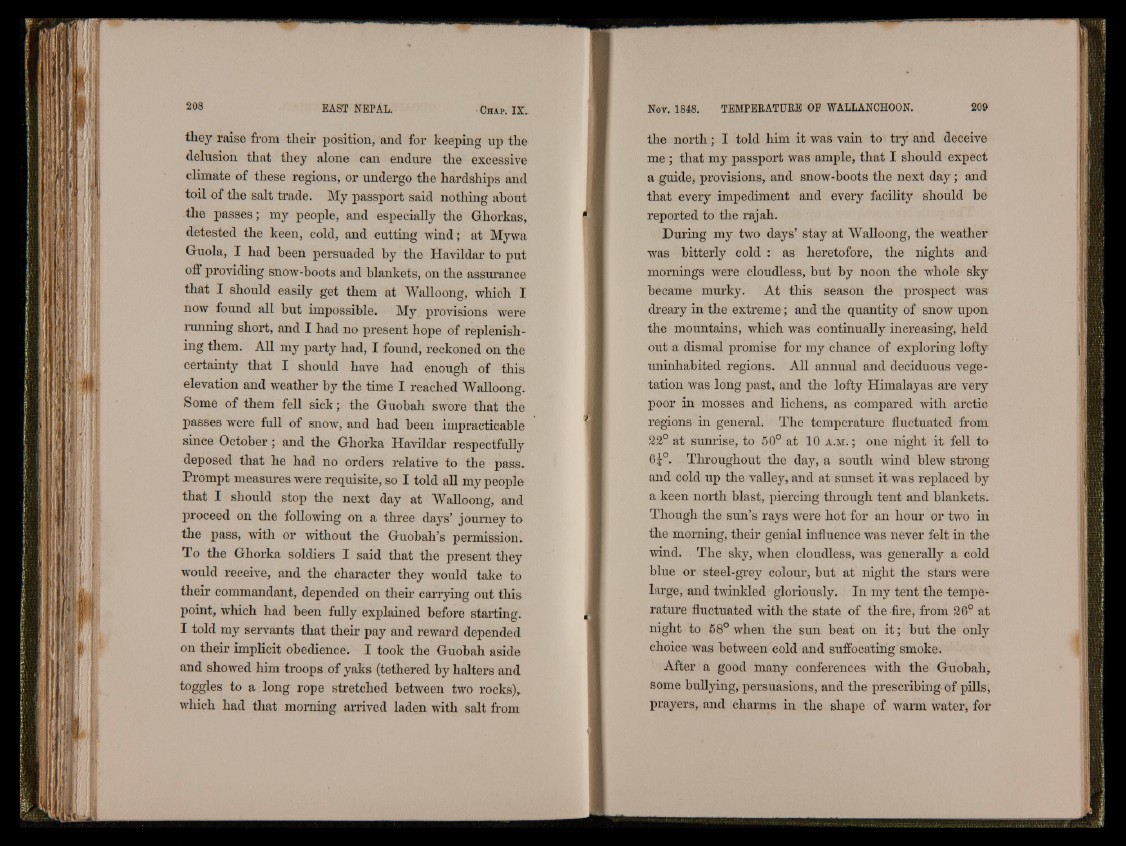
they raise from their position, and for keeping up the
delusion that they alone can endure the excessive
climate of these regions, or undergo the hardships and
toil of the salt trade. My passport said nothing about
the passes; my people, and especially the Ghorkas,
detested the keen, cold, and cutting wind; at Mywa
Guola, I had been persuaded by the Havildar to put
off providing snow-boots and blankets, on the assurance
that I should easily get them at Walloong, which I
now found all but impossible. My provisions were
running short, and I had no present hope of replenishing
them. All my party had, I found, reckoned on the
certainty that I should have had enough of this
elevation and weather by the time I reached Walloong.
Some of them fell sick; the Guobah swore that the
passes were full of snow, and had been impracticable
since October; and the Ghorka Havildar respectfully
deposed that he had no orders relative to the pass.
Prompt measures were requisite, so I told all my people
that I should stop the next day at Walloong, and
proceed on the following on a three days’ journey to
the pass, with or without the Guobah’s permission.
To the Ghorka soldiers I said that the present they
would receive, and the character they would take to
their commandant, depended on their carrying out this
point, which had been fully explained before starting.
I told my servants that their pay and reward depended
on their implicit obedience. I took the Guobah aside
and showed him troops of yaks (tethered by halters and
toggles to a long rope stretched between two rocks),
which had that morning arrived laden with salt from
the n o rth ; I told him it was vain to try and deceive
m e ; that my passport was ample, that I should expect
a guide, provisions, and snow-boots the next day; and
that every impediment and every facility should be
reported to the rajah.
During my two days’ stay at Walloong, the weather
was bitterly cold : as heretofore, the nights and
mornings were cloudless, but by noon the whole sky
became murky. At this season the prospect was
dreary in the extreme; and the quantity of snow upon
the mountains, which was continually increasing, held
out a dismal promise for my chance of exploring lofty
uninhabited regions. All annual and deciduous vegetation
was long past, and the lofty Himalayas are very
poor in mosses and lichens, as compared with arctic
regions in general. The temperature fluctuated from
22° at sunrise, to 50° at 10 a .m . ; one night it fell to
6|°. Throughout the day, a south wind blew strong
and cold up the valley, and at sunset it was replaced by
a keen north blast, piercing through tent and blankets.
Though the sun’s rays were hot for an hour or two in
the morning, their genial influence was never felt in the
wind. The sky, when cloudless, was generally a cold
blue or steel-grey colour, but at night the stars were
large, and twinkled gloriously. In my tent the temperature
fluctuated with the state of the fire, from 26° at
night to 58° when the sun beat on i t ; but the only
choice was between cold and suffocating smoke.
After a good many conferences with the Guobah,
some bullying, persuasions, and the prescribing of pills,
prayers, and charms in the shape of warm water, for